
JOURNAL OF SOILS AND SEDIMENTS
Scope & Guideline
Fostering Dialogue on Soil and Sediment Significance
Introduction
Aims and Scopes
- Soil and Sediment Interaction Studies:
This area covers the physical, chemical, and biological interactions between soils and sediments, investigating how these interactions affect nutrient cycling, pollutant transport, and ecosystem functioning. - Contamination and Remediation Technologies:
Research in this scope focuses on identifying sources and impacts of soil and sediment contamination, particularly from heavy metals and organic pollutants, and developing effective remediation strategies. - Soil Fertility and Agricultural Practices:
Papers often explore the impact of various agricultural practices, including fertilization and organic amendments, on soil health, productivity, and sustainability. - Climate Change and Soil Dynamics:
This includes studies on how climate change affects soil and sediment properties, processes, and functions, particularly in terms of carbon sequestration and nutrient dynamics. - Microbial Ecology in Soils and Sediments:
Research on the role of microbial communities in soil and sediment health, their interactions with plants, and their contributions to nutrient cycling and organic matter degradation. - Technosols and Urban Soil Management:
This area focuses on the development and management of Technosols, especially in urban environments, addressing the challenges posed by anthropogenic activities on soil quality.
Trending and Emerging
- Microplastic Research in Soils:
There is an increasing trend in studies examining the presence, sources, and impacts of microplastics in soils, reflecting growing concerns about plastic pollution and its ecological effects. - Biochar and Soil Amendments:
Research on biochar and other organic amendments is gaining traction, focusing on their role in improving soil health, carbon sequestration, and mitigating pollution. - Soil Health and Ecosystem Services:
A significant rise in publications discussing soil health in relation to ecosystem services, emphasizing the importance of healthy soils for sustainable agriculture and environmental management. - Advanced Analytical Techniques:
Emerging methodologies, including machine learning and advanced spectroscopy, are increasingly employed to analyze soil and sediment properties, improving predictive capabilities and data accuracy. - Climate Change Adaptation Strategies:
Research addressing how soils can be managed or modified to adapt to climate change effects is on the rise, reflecting the urgency of this global challenge. - Urban Soil Dynamics:
With urbanization increasing, studies focusing on urban soils and their management, including Technosols, are becoming more prominent as cities seek sustainable practices.
Declining or Waning
- Traditional Soil Conservation Techniques:
There appears to be a decreasing trend in publications focused on conventional soil conservation methods as researchers lean towards more innovative approaches and technologies. - General Soil Chemistry Studies:
Research that solely focuses on basic soil chemistry without integration into broader environmental or ecological contexts has seen a decline, possibly overshadowed by more applied studies. - Historical Soil Studies:
There is less emphasis on historical soil studies that document changes over time, as the journal's focus shifts towards contemporary issues and immediate environmental challenges. - Sediment Transport Mechanisms:
While still important, the focus on classical sediment transport mechanisms has waned, with more emphasis now placed on sediment quality and its interactions with contaminants. - Single-Pollutant Studies:
Research examining the effects of single pollutants in isolation is less common, as the field moves towards understanding complex mixtures and their synergistic effects.
Similar Journals
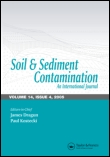
SOIL & SEDIMENT CONTAMINATION
Advancing knowledge in environmental chemistry and soil science.SOIL & SEDIMENT CONTAMINATION is an esteemed journal published by Taylor & Francis Inc, focusing on critical research in the realms of environmental chemistry, soil science, and pollution. With an ISSN of 1532-0383 and an E-ISSN of 1549-7887, the journal serves as a vital platform for disseminating innovative studies from 1996 to 2024, offering insights that are pivotal to both academic and professional communities. Operating from the United Kingdom, this journal holds a respectable ranking within Q3 in Environmental Chemistry and Health, Toxicology and Mutagenesis, and Q2 in Soil Science as of 2023, indicating its significance in the respective fields. Researchers and professionals are encouraged to explore the journal's open access options, enhancing visibility and access to groundbreaking studies on soil and sediment contamination. With a Scopus ranking placing it in the 66th percentile for Soil Science and substantial contributions to understanding environmental pollutants, SOIL & SEDIMENT CONTAMINATION is essential for those dedicated to advancing the science and remediation of contaminated environments.
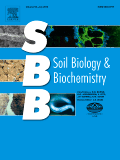
SOIL BIOLOGY & BIOCHEMISTRY
Elevating Soil Science to New HeightsSOIL BIOLOGY & BIOCHEMISTRY, published by Pergamon-Elsevier Science Ltd, is a premier academic journal that plays a pivotal role in advancing the fields of microbiology and soil science. Established in 1969, this esteemed journal has gained recognition for its rigorous publication standards and impactful research contributions, evidenced by its prestigious Q1 rankings in both Microbiology and Soil Science categories for 2023. With an impressive Scopus rank of #3 among 159 in Agricultural and Biological Sciences and #14 among 182 in Immunology and Microbiology, it boasts a notable 98th percentile in its field. The journal offers researchers, professionals, and students a vital platform for sharing innovative studies and insights about soil ecosystems and their biochemical processes, fostering greater understanding and collaboration within the scientific community. While Open Access options are currently not available, the journal remains a cornerstone for those seeking to deepen their knowledge and contribute significantly to soil biology and biochemistry.
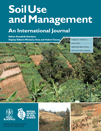
SOIL USE AND MANAGEMENT
Innovating solutions for effective soil management.SOIL USE AND MANAGEMENT is a premier academic journal published by Wiley, focusing on the critical domains of Agronomy, Crop Science, Pollution, and Soil Science. With an ISSN of 0266-0032 and an E-ISSN of 1475-2743, the journal has established itself as a vital resource in the field since its inception in 1985. Operating from its U.S. headquarters in Hoboken, NJ, SOIL USE AND MANAGEMENT boasts impressive Q1 rankings across its relevant categories, indicating its standing in the top tier of research journals. Notably, it is ranked 48th out of 406 journals in Agronomy and Crop Science and holds an 88th percentile position, as well as a commendable rank of 26th out of 159 journals in Soil Science, underscoring its influence and reach. This journal serves as an essential platform for researchers, professionals, and students dedicated to sustainable soil management practices and understanding soil's role in agricultural productivity and environmental health. Although it does not offer Open Access, its rigorous peer-review process ensures the publication of high-quality original research, reviews, and case studies critical for advancing knowledge and practice in the field. This journal is crucial for anyone engaged in soil science and its related disciplines, encouraging innovative approaches to challenges facing soil use and management today.

Spanish Journal of Soil Science
Unlocking the Secrets Beneath Our FeetThe Spanish Journal of Soil Science is a prestigious open-access journal published by FRONTIERS MEDIA SA since 2011. Based in Switzerland, this journal serves as a vital platform for disseminating innovative research and applications within the field of soil science. With its commitment to accessibility, the journal enables researchers, professionals, and students from around the globe to contribute to and benefit from its wealth of knowledge. As of 2023, it holds a respectable Q3 category ranking in soil science and is positioned at #88 out of 159 in the Scopus rankings for Agricultural and Biological Sciences. The journal aspires to foster collaboration and communication among soil scientists, encouraging the exploration of contemporary soil issues, sustainable practices, and advancements in technology. Its open-access model ensures that the latest findings are freely available, promoting a broader impact in environmental and ecological studies.
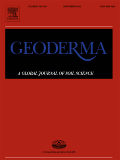
Geoderma
Connecting Soil Science with Global ImpactGeoderma is a leading academic journal published by ELSEVIER, focused on the vital field of Soil Science. With an impressive impact factor and ranking as Q1 in its category for 2023, this journal stands as a prominent platform for researchers and professionals seeking to explore advanced scientific studies related to soil and its relationships with the ecosystem. Covering a wide range of topics from soil formation and characterization to land use and management practices, Geoderma is recognized for its rigorous peer-review process and is highly regarded within the global scientific community, as evidenced by its ranking of #12 out of 159 in the Scopus categories of Agricultural and Biological Sciences and Soil Science, placing it in the top 92nd percentile. With its inception dating back to 1967, the journal continually adapts and converges its content to meet the evolving demands of soil research until 2024 and beyond, providing invaluable insights for students, professionals, and researchers alike.
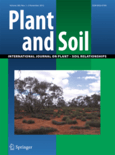
PLANT AND SOIL
Exploring the vital connections between plants and their soil.PLANT AND SOIL is a prestigious academic journal that has been at the forefront of plant and soil research since its inception in 1948. Published by SPRINGER in the Netherlands, this journal has carved a niche as a leading source of high-quality, peer-reviewed articles, which are essential for researchers, professionals, and students in the fields of Plant Science and Soil Science. With an impressive impact factor placing it in the Q1 category of both disciplines, it ranks 50th in the field of Plant Science and 24th in Soil Science, highlighting its influence in the scientific community. Although not available as open access, the journal provides a wealth of knowledge and insights into the interactions between plants and soils, exploring critical topics such as soil health, crop productivity, and sustainable agriculture practices. Researchers who wish to contribute to this vital area of study through their empirical findings will find PLANT AND SOIL to be an invaluable platform for disseminating their work and connecting with a network of leading scholars committed to advancing our understanding of these essential ecosystems.

Frontiers in Soil Science
Cultivating insights for sustainable agriculture.Frontiers in Soil Science, published by FRONTIERS MEDIA SA in Switzerland, is an esteemed open-access journal dedicated to advancing our understanding of soil systems and their vital role in ecosystem functioning and sustainable agricultural practices. Since its inception in 2021, this journal has quickly established itself within the scientific community, boasting a 2023 Scopus Q2 ranking in Soil Science and a notable percentile of 41 among its peers. Researchers and practitioners in the field will find a wide array of original research, reviews, and contributions that address key topics such as soil health, carbon sequestration, and nutrient cycling. With a commitment to fostering collaboration and dissemination of knowledge, Frontiers in Soil Science serves as a vital resource for professionals, researchers, and students who aspire to innovate and lead in soil science research.

Soil Research
Connecting researchers to foster soil stewardship.Soil Research, published by CSIRO PUBLISHING, is an esteemed scholarly journal dedicated to advancing the field of soil science, environmental science, and earth-surface processes. With an ISSN of 1838-675X and E-ISSN of 1838-6768, this journal serves as a vital platform for researchers and professionals to disseminate innovative findings and engage with contemporary challenges in soil and environmental management. The journal is recognized for its impactful contributions, as evidenced by its Q2 ranking in 2023 across multiple categories including Earth-Surface Processes, Environmental Science, and Soil Science, reflecting its influence and relevance in these critical academic areas. Operating from its headquarters in Clayton, Victoria, Australia, Soil Research is committed to fostering open access to research, ensuring wider dissemination of knowledge. As it converges toward its future objectives until 2024, the journal aims to provide a forum for diverse perspectives that enhance understanding and stewardship of soil resources, making it an indispensable resource for students, researchers, and industry professionals alike.

Malaysian Journal of Soil Science
Empowering Global Perspectives in Soil Science.The Malaysian Journal of Soil Science, published by the Malaysian Society of Soil Science, serves as a vital platform for disseminating high-quality research in the fields of Agronomy and Crop Science as well as Soil Science. With an ISSN of 1394-7990, this peer-reviewed journal has made significant strides since its establishment in 2009, currently positioned in the Q2 quartile for both categories as of 2023. The journal aims to advance knowledge surrounding soil health and management practices, particularly within the Malaysian context, while also addressing global soil science issues. Despite being based in Malaysia, it welcomes contributions from a diverse range of geographies and viewpoints, enriching the academic discourse. Researchers and practitioners in this field will find a wealth of innovative studies and findings that reflect the current trends and challenges in soil management. Given its current rankings in Scopus, the journal plays a crucial role in shaping the future of soil science, making it indispensable for anyone dedicated to advancing research and practical applications in agricultural and environmental sciences.
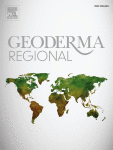
Geoderma Regional
Connecting research and practice in soil science.Geoderma Regional is a premier scholarly journal dedicated to advancing the field of Soil Science. Published by Elsevier in the Netherlands, this journal serves as a vital platform for disseminating high-quality, peer-reviewed research that spans the complexities of soil management, behavior, and the implications of soil processes on environmental sustainability. Since its inception in 2014, Geoderma Regional has achieved an impressive position within the academic community, holding a Q1 ranking in the field of Soil Science, placing it among the top 20% of journals in its category according to SCOPUS rankings. This journal is particularly distinguished for its significant contributions to the nexus between agriculture and biological sciences, reflected in its rank of #33 out of 159 in this field with a commendable 79th percentile. Researchers, professionals, and students alike will appreciate the journal's commitment to open discourse and innovative research agendas as it aspires to enhance our understanding of soil dynamics, addressing critical issues facing our planet.